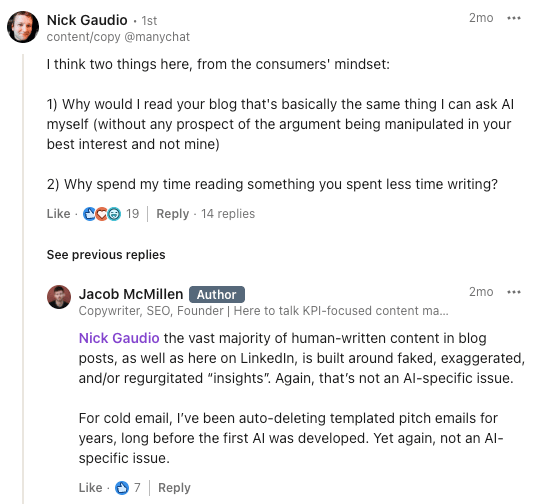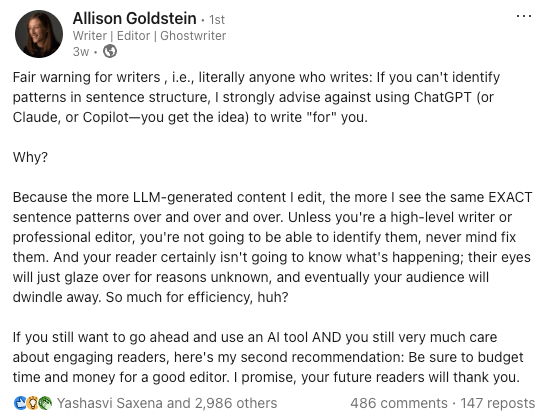- Top of the Funnel
- Posts
- Spiky content 🌵
Spiky content 🌵
What Guy Fieri's frosted tips can teach you about thought leadership
Want your content to earn clicks, build brands, and drive sales?
Then make it spiky 🌵
That’s what Wes Kao told us way back in 2020.
And since then, it’s only gotten harder to get noticed (luv u AI 🫶).
So I thought I’d revisit Wes’s banger article Spiky point of view: Let’s get a little controversial
And illustrate it with some examples of spiky points of view from the wild along the way 👀
Ready to learn how to create content that’s spikier than Guy Fieri’s frosted tips?
Then let’s dive right in 👇🧵
🌵Wtf is a spiky point of view?
Over to Wes:
“A spiky point of view is a perspective others can disagree with. It’s a belief you feel strongly about and are willing to advocate for. It’s your thesis about topics in your realm of expertise.”
In other words:
A spiky point of view is an essential ingredient of any content worth calling “thought leadership”.
🤷 How do you know if a POV is spiky?
Wes says a spiky POV has five elements.
Here’s each one, illustrated with an example from the wild:
1️⃣ A spiky point of view can be debated
You’ve seen those “here’s how to spot if content was written by AI” LinkedIn posts, right?
Jacob McMillen has seen them too.
And he thinks they’re stupid AF.
Because one of his spiky point of views is:
Who cares if it was written by AI or a human? What matters is if it’s achieving its KPIs.

That take can deffo be debated.
And it was in the comments 👀

That’s a good thing.
Some folks are gonna see Jacob’s post and think “I never wanna work with that guy”.
But some are gonna think “finally, someone talking some sense”.
And those are the ones that matter, right?
2️⃣ A spiky point of view isn’t controversial for the sake of it
One of Erica Schneider’s spiky points of view is that the conventional wisdom around niching down is ass-backwards.
Hot take, right?
She could have said:
The conventional wisdom around niching down is STUPID and if you follow it YOU DESERVE TO GO OUT OF BUSINESS.
That would’ve probably made a bigger splash.
Instead, she said:
Niching by industry/segment/deliverable/audience is limiting. Instead, niche on the problem.
That’s probably going to lead to more clients 👀

3️⃣ A spiky point of view teaches your audience something relevant they don’t already know
Wes say
s a spiky point of view leaves the reader thinking:
“Hmm I hadn’t thought about it that way but this is so true. This is making me rethink a lot of things.”
That’s how Lily Ugbaja left me feeling the other day.
One of her spiky points of view is:
SME input ≠ quotes. Your goal isn’t to report what an SME said, but to translate their expertise into something actionable for your audience.

4️⃣ A spiky point of view is rooted in evidence, but it doesn’t have to be a proven fact or universal truth
“If you wait for 100% consensus before you say your spiky point of view out loud, that day will never come,” says Wes.
So, it needs to be defensible. You need the receipts for your hot takes.
Ryan Law got the memo on this one.
Some people think optimising a site for appearing in AI-generated search results is a totally different discipline than “traditional” SEO. They’re calling it GEO (presumably as a placeholder until they can think of a good name for it 🤷).
One of Ryan’s spiky points of view is that GEO is just SEO.
But he knew that’s gonna stick in some folks’ craws.
So he defended it better than prime Maldini 👌
He found six ways GEO actually is different from SEO…
But says, big picture, it’s still just SEO 🤷

5️⃣ A spiky point of view requires conviction
It’s easy to confuse “conviction” with clickbait:
“STEAL the SECRET FORMULA behind my VIRAL social hooks”
🙄
Allison Goldstein embodies a quieter conviction.
One of her spiky points of view is:
You shouldn’t use AI to write “for” you (unless you’re a high-level writer or professional editor)
And she says it with conviction. Just not the “if you’re not waking up at 5am to a cold shower and a Huel enema then you’re WASTING YOUR DAY” kind.

🫵 How to find your (or your client’s) spiky point of view
You can’t create anything worth calling thought leadership content without a spiky point of view.
That goes for your client work. And it goes for any content you put out under your own name, too.
So, how do you find those spiky POVs?
Shoutout to Wes for giving us a handy list of questions to ask ourselves (or our clients):
What are 3–5 spiky points of view you have about your craft?
What’s something you believe that others might disagree with? These should be on topics where you are credible and that are relevant for your audience. Otherwise it’s a random hot take or opinion, and opinions are cheap.
What do you wish more people understood? This should be something that makes you a little angry or frustrated. Conviction and emotion matter here—if it’s something you’re ambivalent about, it’s not worth your time to convince others.
Jot down what you’ve said that made your audience (customers, clients) say “Hmm I never thought of it like that before. This is so true and it’s making me rethink a lot of things.”
What’s a generally accepted best practice that everyone seems to do or believe is good, that you think is not useful or doesn’t work based on your experience?
Run through those and you’ll be well on your way to creating actual thought leadership content (not just SEO content with some SME quotes sprinkled on top).
Want more tips on how to find your spiky points of view? Then check out…
The latest from TOFU community
This week in TOFU we’ve been chatting pitching…

 | TOFU Community Manager |